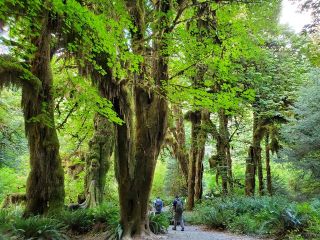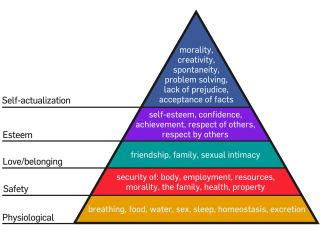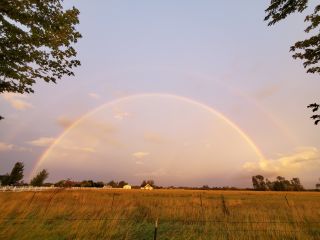Environment
How Nature Makes Us Human
Unleash your nature instinct—and enhance your health and happiness.
Updated July 23, 2024 Reviewed by Devon Frye
Key points
- Nature isn’t just a backdrop; it’s a vital part of who we are.
- Nature has the power to make us healthier, wealthier, and wiser.
- To unlock the countless benefits, we need to immerse ourselves in nature more frequently.

Abraham Maslow was wrong. When he proposed his theory of human needs, he overlooked one crucial element in his hierarchy: nature.
This realization hit me when Camping World Holdings, Inc. (stock symbol: CWH), a retalor specializing in outdoor gear–caught my attention by chance. On February 18, 2020, CWH was trading at $17. But as the COVID-19 pandemic spread panic, it plummeted to $3.40—a staggering 80 percent loss in just 20 trading days. Then, something extraordinary happened: stimulus checks and other government interventions released vast amounts of money into the economy.
As the market stabilized, Camping World’s stock began to soar. By August 3, a mere four and a half months later, it reached $43—nearly 200 percent better than the S&P 500, the benchmark of general market performance. The reason? CWH’s business was booming with blockbuster earnings and rising dividends. This trend continued until the summer of 2023.

Why did the company do so well? The reason was immediately clear: people were heading outdoors like never before. In the Pacific Northwest, where I stayed, parks were packed, and campsites were fully booked every weekend and holiday. Entrances to many national parks turned into gridlocks, resembling rush hour in New York City, L.A., or Chicago.
Maslow's third level of needs—love and belonging, which includes family, friends, and intimacy (Figure 1)—overlooked our deep-rooted connection with nature. When the pandemic forced us to minimize social interactions, we sought to fill that void by reconnecting with the natural world. We rushed outside to reestablish our bond with nature.

The above case offers a glimpse into a fundamental dimension of our psychological needs: our bond with nature, which translates into business and money. Consider the value of a property overlooking a crystal-clear lake, a snow-capped mountain, or an expansive ocean. Even a few trees can significantly boost its valuation. This is why many cities mandate greenbelts in housing projects. The added value from a touch of nature mirrors our basic human needs, a topic explored in tens of thousands of publications in environmental psychology. Here are some of the major benefits (besides money):
- Nature brings happiness. It lowers anxiety and stress, reduces the risk of depression, and improves mental well-being. Spending just two hours a week in a forest can reduce your blood cortisol levels by 21 percent (1). Even simple access to gardens or small green spaces can make a measurable difference for the better (2).
- Nature heals. Trees emit chemical compounds that strengthen your immune system. Walking in a forest for 30 minutes can lower your blood sugar levels by 40 percent—great news for people with diabetes. Daily gardening could reduce the risk of dementia by 36 percent. Exposure to sunlight could be as effective as taking Prozac for seasonal affective disorder (SAD) or Ritalin for children with ADHD. Even placing a few plants in a hospital ward can help patients feel less pain and heal faster. This is just a snapshot of the many diseases and conditions that nature can help alleviate, making nature-based medicine increasingly mainstream (3).
- Nature enriches. Nature restores our attention, opens our minds, piques our curiosity, and enhances cognitive control, learning, and memory. It can even improve our social relationships (think about strolling or hiking with family or friends). These effects are particularly pronounced for city dwellers under the stress of busy schedules and crowded living conditions (4). Children, of course, benefit the most from activities in nature. Remember those field trips from your school days?
- Nature inspires. Countless philosophers, poets, artists, composers, scientists, and writers throughout history and today find nature an infinite source of inspiration. For instance, Henry David Thoreau transcended himself at the side of Walden Pond. Charles Darwin developed his magnum opus On the Origin of Species while walking along Sandwalk, a tree-lined trail on the periphery of his 35-acre property. John Muir awakened American environmental consciousness by trekking the wilderness from Wisconsin to Florida and from California to Alaska.

These insights illuminate the profound and multi-faceted role nature plays in our lives. From boosting our mental and physical health to enriching our cognitive abilities and inspiring our creativity, nature is an essential part of humanity.
The great thing is, you don't need to do much to reap the benefits of nature. You can engage in a variety of activities with family, friends, and especially kids (which I often do): picnicking, camping, gardening, hiking, fishing, mushroom-picking, bird-watching, plant identification, butterfly-catching (and releasing), beaver observation, cloud appreciation, star-gazing, and much, much more. Even getting a bit dirty in the mud or splashing in puddles is often more fulfilling than staying indoors.
How do you enjoy nature? Let’s share.
References
1. Li, Q., 2010. Effect of forest bathing trips on human immune function. Environmental health and preventive medicine, 15, pp.9-17.
2. Patwary, M.M., Bardhan, M., Disha, A.S., Dzhambov, A.M., Parkinson, C., Browning, M.H., Labib, S.M., Larson, L.R., Haque, M.Z., Rahman, M.A. and Alam, M.A., 2024. Nature exposure and mental health during the COVID-19 pandemic: A Navigation Guide systematic review with meta-analysis. Environmental Pollution, p.124284.
3. La Puma, J., 2023. What is Nature-Based Medicine and What Does It Do?. American Journal of Lifestyle Medicine, 17(4), pp.466-469.
4. Bolouki, A., 2023. Neurobiological effects of urban built and natural environment on mental health: systematic review. Reviews on Environmental Health, 38(1), pp.169-179.


